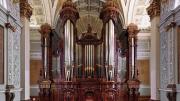The Methuen Memorial Music Hall, with its lavish English baroque-inspired interior, was built to house the first concert organ in the United States. It’s worth a visit, even for those who find the music emitted by the 6,088-pipe instrument a bit bombastic, or associated only with church services. People bring “baggage to the table,” says concert organist Carson P. Cooman ’04, research associate in music and composer in residence at Harvard’s Memorial Church, just as they do with “other forms of classical instruments…in a world where pop music reigns.” He took up the organ at age 10, mastering its traditional range and flourishes, as in J.S. Bach’s Toccata and Fugue in D Minor, but now he specializes in contemporary works. He’ll perform “Yankee Doodle Variations,” by Carlotta Ferrari, among other pieces, on July 18 for the hall’s summer and fall concert series.
Watching organists, dwarfed by 64-foot pipes, maneuver keys and pedals while you puzzle out the musical mechanics can be half the fun. (Air vibrating through different-sized pipes produces the panoply of sounds.) The Methuen organ was built in 1863 in Germany for the Boston Music Hall. Edward F. Searles, a rags-to-riches, Methuen-born interior designer, bought it later and built the hall. The splendor speaks to his respect for the instrument; the three-foot-thick walls to its power.









